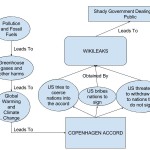My diagram basically outlines what went on behind the scenes of the events surrounding the Copenhagen Accord, or how the article says. This all starts with, in my opinion, the United States is trying to do its part in cutting carbon emissions and other harmful gasses because they are the historical leader in the world’s pollution and want to make up for it in a way. So the United States tries to supply financial aid to other countries in exchange for their support of the accord in a way similar to the shady dealings of Frank Underwood in House of Cards as Majority Whip. If the United States wasn’t going to get the signature it wanted from one of the nations, it would simply revoke its aid as a ploy to get its way. It’s a simple strategy. Bribes for support…very mobster of them. These back-channel communications of world leaders made for some interesting negotiations. “Sign the accord of discussion ends now” the United States threatens to Ethiopia. In which Ethiopian Prime Minister Meles Zenawi responds with a request for assurance from President Obama. This was all made available through WikiLeaks in 2010. At the time of the article, 140 nations were in compliance with the accord, which was near the target signatures that were intended by the United States. That is 75 percent of United Nations climate change convention members and those 140 nations are responsible for nearly 80 percent of the current greenhouse gas emissions in the world.
Using my own thoughts and from lessons we discussed in this class in prior weeks like ethics, this was not the most ethical way to gain support for climate change discussions. And that is not the only other ethical issue at hand. Was it ethical for these dealings to be made public by WikiLeaks? That is up for debate. In my opinion, the country and the world deserves the right to know how its own country does business with allies and other nations across the world. WikiLeaks took the country by storm in 2010 with details about a bunch of government secrets similar to this issue of the Copenhagen Accord. What about the ethical issue of the back-channel trades between the United States and others? Aid for Signatures. Am I supposed to believe that this doesn’t happen every day between counties in the United Nations? After learning more about how government works in classes in high school and college, it becomes apparent that trades like these happen a lot in everyday government business whether it is gathering votes for a bill or what have you. Although I understand its reasoning, I still do not like how the United States was conducting business here. Sure, trade aid for a signature. However, don’t threaten the countries for not being willing to be forced into signing something they do not want. That is where I draw the line.


Hey Tyler, I really enjoyed the way you laid out your diagram, super clean and readable. I would have liked to see if your diagram came back together at the end showing how the accords also effected climate change. I agree with your passion on how the US treats other countries unfairly and how politics which is supposed to be for the people has been moved behind closed doors! If you would like to read my post too try and catch so more similarities the link is http://sites.psu.edu/geog30/2016/04/08/climate-change-11/
Hi Tyler,
My blog can be found here, http://geog030.dutton.psu.edu/2016/04/08/katie-greiner-module-9/
I selected your blog post because you really tackled the issue of the ethics used in government. I like how you incorporated prior knowledge on trading used in the government into your post. I agree with your thoughts on how the US made a poor decision in threatening other countries to agree with them. I posted about how I have a similar opinion on this issue. I think that what the US did was wrong.